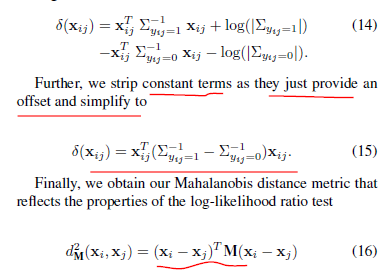In this paper, we raise important issues on scalability and the required degree of supervision of existing Mahalanobis metric learning methods. Often rather tedious optimization procedures are applied that become computationally intractable on a large scale. Further, if one considers the constantly growing amount of data it is often infeasible to specify fully supervised labels for all data points. Instead, it is easier to specify labels in form of equivalence constraints. We introduce a simple though effective strategy to learn a distance metric from equivalence constraints, based on a statistical inference perspective. In contrast to
existing methods we do not rely on complex optimization problems requiring computationally expensive iterations. Hence, our method is orders of magnitudes faster than comparable methods. Results on a variety of challenging benchmarks with rather diverse nature demonstrate the power of our method. These include faces in unconstrained environments, matching before unseen object instances and person re-identification across spatially disjoint cameras. In the
latter two benchmarks we clearly outperform the state-ofthe-art.
KISS Metric Learning

假设差向量分别服从0均值的高斯分布(同类和异类),则用最大似然估计协方差矩阵。


